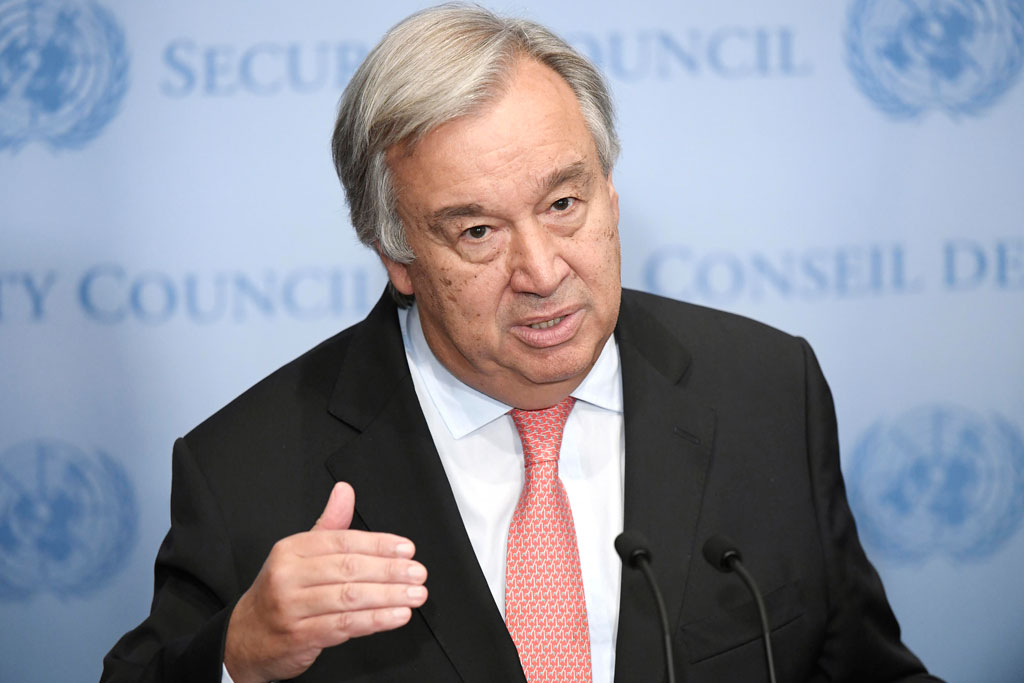In two weeks’ time, world leaders will be here in the General Assembly to address the full range of global challenges.
But in recent days we have seen the dramatic aggravation of three of the main threats we face as an international community: the nuclear threat, sectarianism and climate change.
The latest nuclear and missile tests by the Democratic People’s Republic of Korea are profoundly destabilizing for regional and international security. I condemn them unequivocally.
Yet again, the DPRK has broken the global norm against nuclear test explosions.
Yet again, the country has defied the Security Council and the international community.
Yet again, the DPRK has needlessly and recklessly put millions of people at risk -- including its own citizens already suffering drought, hunger and serious violations of their human rights.
I call again on the DPRK authorities to comply fully with its international obligations, including Security Council Resolution 2371 adopted last month.
I welcome yesterday’s meeting of the Council. The unity of the Council is crucial in addressing this crisis.
That unity also creates an opportunity to engage diplomatically to decrease tensions, increase confidence and prevent any escalation -- all aimed at the denuclearization of the Korean Peninsula.
Let us promote the dialogue and communication necessary to avoid miscalculation [or] misunderstanding.
Confrontational rhetoric may lead to unintended consequences.
The solution must be political. The potential consequences of military action are too horrific.
As Secretary-General, I am ready to support any efforts towards a peaceful solution of this alarming situation, and as I said, to the denuclearization of the Korean peninsula.
Let me turn now to sectarianism.
I am deeply concerned about the security, humanitarian and human rights situation in Myanmar’s Rakhine State.
We are all aware of a long-standing history of discrimination, hopelessness and extreme poverty in that State.
I have condemned the recent attacks by the Arakan Rohingya Salvation Army.
But now we are receiving constant reports of violence by Myanmar’s security forces, including indiscriminate attacks.
This will only further increase radicalization.
Nearly 125,000 people—victims of unbearable suffering and desperation -- have sought refuge in Bangladesh.
Many people have lost their lives trying to flee the violence.
The grievances and unresolved plight of the Rohingya have festered for far too long and are becoming an undeniable factor in regional destabilization.
I have written officially to the President of the Security Council to express my concern and to propose various steps to end the violence and address the underlying causes of the crisis.
The international community must undertake concerted efforts to prevent any further escalation and to seek a holistic solution.
The authorities in Myanmar must take determined action to put an end to this vicious cycle of violence and to provide security and assistance to all those in need. I urge them to ensure unhindered humanitarian access for life-saving relief operations.
At the same time, it is no longer possible to delay an effective action plan to address the root causes of the crisis. It will be crucial to give the Muslims of Rakhine State either nationality or, at least for now, a legal status that will allow them to have a normal life, including freedom of movement and access to labour markets, education and health services.
The recommendations of the report of the Advisory Commission on Rakhine led by my predecessor Kofi Annan, and which the Government has signalled it accepts, must be fully implemented.
I am grateful to the authorities of Bangladesh for their decision to allow refugees to enter the country, and I encourage them to meet the needs of recent arrivals.
The United Nations is and will remain totally committed to help.
For my part, I will continue to engage with all relevant parties in the region and beyond.
Finally, ladies and gentlemen of the media, we continue to see climate change gather force.
I want to express my solidarity with all those suffering the devastating impacts of the unprecedented events we have seen in recent weeks from Texas to Bangladesh, India, Nepal and Sierra Leone.
The United Nations stands ready to support relief efforts in any way possible.
The number of natural disasters has nearly quadrupled since 1970.
The United States, followed by China and India, have experienced the most disasters since 1995.
Last year alone, 24.2 million people were displaced by sudden-onset disasters – three times as many as by conflict and violence.
Even before the current floods, preliminary reports for this year show that there have been 2,087 deaths from natural disasters.
It is true that scientists caution us about linking any single weather event with climate change.
But they are equally clear that such extreme weather is precisely what their models predict will be the new normal of a warming world.
With science forecasting a dramatic rise in both the frequency and severity of disasters, it is time to get serious about keeping ambition high on climate action – and on building resilience and reducing disaster risk.
Thank you.

